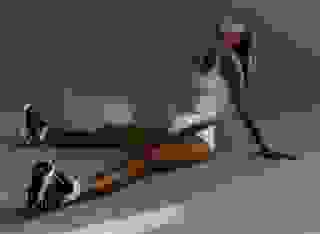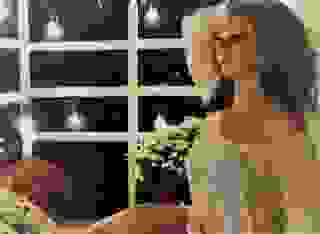- Romance
- The Memories of Trees Ch. 01-03
Note: You can change font size, font face, and turn on dark mode by clicking the "A" icon tab in the Story Info Box.
You can temporarily switch back to a Classic Literotica® experience during our ongoing public Beta testing. Please consider leaving feedback on issues you experience or suggest improvements.
Click hereFirst word that the world was ending sneaked past Collin's ears sometime between lunch and his daily checks of Petri dishes.
He tried to remember his reaction when a cadre of generals, military brass and government spooks arrived in the laboratory to call the entire research complex into an emergency meeting. Collin realized something went wrong with the project then, probably even knew intuitively that the project went deadly awry.
What did he feel exactly? He couldn't remember. Cold perhaps. Stunned maybe. Reflections on memory three years after the fact didn't help clarify anything either.
At the moment a freight train lumbered past the only remaining coffeehouse open in Gannis Falls, steel on steel trembling the floor beneath him with gentle, almost soothing vibrations. But the train, for no apparent reason, stirred a latent memory of an emotion he might have felt at the moment he learned the world was ending.
He remembered the chilled effects of bloodless resignation. But did Collin really feel that? Or did memory and current brain chemistry betray a kind of cinematic lucidity that was more lie than truth?
Collin Bainbridge got philosophical at the oddest moments.
Oct 23, 2005 was often on his mind anymore, replayed over and over, as did memories of television; brief, dramatic images from news broadcasts in the months of the great plague. Mass burials, emaciated victims in hospital beds lining hallways and even subbasements of hospitals that were once relegated to rows of industrial washing machines and ductworks.
There was one memory of that day that Collin knows wasn't fabricated since then. Melissa. Melissa Durden.
In the frozen minutes as Jack Chang, the portly Samoan who headed the project, told them in a voice caked in worn emotions and disbelief that the virus mutated, turned deadly – something akin to influenza, but much faster, more contagious – all Collin could think about with any clarity was Melissa.
What had it been that day, seven years since graduation from Gannis Falls High School? Seven years since Melissa gave him a diplomatic hug, a peck on his cheek and wished him luck as their navy gowns, made of cheap polyester that weighed like sodden tarp on their bodies. Seven years since Collin fought against the gusts that rose during the pewter morning of commencement. Seven years since Melissa pretended that nothing ever happened between she and Collin in Las Vegas just weeks before.
Seven years later and as a stern looking general explained that they were to remain in the laboratory complex indefinitely, all Collin could think about was Melissa Durden.
That preoccupation remained with him the following three years, and was perhaps the sole reason Collin decided to come home again. He checked his watch, its leather band caked and worn, still loose even on the last hole.
Behind him the nameless bald man cleared his throat, sipping coffee and reading the local paper. Its front page still contained stories about the virus, the progress on inoculation, memories of the dead and just how the country would carry on. But those stories started to drift toward the bottom of the front page, no longer blared in deep block letters above the fold. Today Gannis Falls had a new mayor, enough to tout black ink prominently along the front without word pertaining to the virus or numbers of fatalities. Collin wanted the nameless man to disappear, but that would be a long shot. His portly form, the balding head, would shadow Collin for his entire trip to Gannis Falls. Silent, polite as well, but with him all the time. And there wasn't a damn thing Collin could do.
The girl behind the counter remained absorbed in a book as she perched on a stool, ignoring the two of them drinking coffee. The silent, unnamed man behind Collin sipped and read the paper. Collin took in the coffeehouse, the rustic look, the ash-stained hearth that seemed well-used, and the counter, its face potmarked with bare patches and rogue splinters in areas. The muffled tinkling of porcelain coffee mugs kissing from the tremors was the only sound in the shop.
Collin brushed his jeans off and stood while the bells of empty coffee cups rang out, masking the scrapes of the chair against the floor. But the movement was enough to gain attention. The nameless man stood as well, placed two dollars on his table and slid past Collin and out the door. The girl's eyes following him momentarily until they rested on Collin with some discovered interest.
Collin smiled as he shuffled two dollars onto the table. The girl's eyes remained on him as a fingernail absently tapped her front tooth.
"Thanks for the coffee. It was delicious," Collin said, not really knowing what else to say.
"Are you here for the reunion?" the girl asked. Collin noticed her shirt, a black tee shirt with a worn image of the band Black Flag across the curves of her breasts. He decided she was pretty, dark hair and skin, light amounts of makeup barely camouflaging rosy blemishes on her cheeks. She was pretty in a way that promised a budding world of sexuality in the next year or so.
"Uh, yea. Class of '97," he said.
"That's amazing. This town's really excited about it; the first reunion since the plague," she said.
Collin grimaced at that, stifling a pang of guilt. First one since the plague, and only a third of the graduating class of '97 responded. He had read in the paper that morning that two of his former classmates attempted to track down the senior class, mailing notices to all last known addresses.
A third responded. Most others were returned with a postmaster stamp along the front with its glaring red letters of Household Deceased on the front.
"Who are you?" she asked as he gathered his jet sport coat.
"Collin Bainbridge. I grew up on Sugar Hill Plain, up the way," he said. Again, no feeling there. No sense of remorse, sadness or even stilted pain. Just a fact. He grew up in a white two-story platboard house on Sugar Hill Plain, one of many similar houses along the row.
"Wow. That's cool," she said. "I think I remember you."
"Really?"
"Yea. You knew my cousin. Tracy Wheatley."
Collin dreaded this part. It took little precognition anymore to know where the conversation was headed.
"She died in the plague," the girl said. Collin mumbled an apology, a kind of half-aware apology anymore. Mostly it just came out as a trained response, much like saying bless you to those who sneezed. Everyone did it anymore. There was little else Collin could say to the survivors.
But Collin wrestled with guilt over Tracy. He remembered the girl clearly, a crystal beauty as he often thought. Blondish hair, thin, but with a thin-lipped smile that seemed to dominate her face. Tracy had been disarming in high school, and she and Collin were friendly, if nothing more than acquaintances.
Still, Collin printed her name in his imaginary notebook of things to feel responsible for in what was left of his life.
"And you are? I'm sorry, I didn't get your name," he said after the moment he let his thoughts wander into the dreary plains of guilt.
"Missy Peck. I'm in the second graduating senior class this year since school started again after the plague," she smiled, and studied Collin when he didn't respond. "Hey sweetie, don't worry. Tracy died as a wonderful wife and a true Christian believer. She's with God, you know."
Collin smiled and said he didn't doubt it.
CH.2
Being with God. The thought comforted. It feigned a sense of numbed acceptance, sneaking upon a person in slight degrees like a pill slipped in a drink. Most everyone Collin spoke with, met in the past few days, accepted that they survived. The comfort came with the thought that their friends, their family, children, brothers, sisters, teachers, neighbors, were with God.
Collin doubted God anymore, so that wasn't a comfort. If anything, he readily avoided thoughts of afterlife. The numbers, the statistics, the images of the casualties in hospital wards, bodies dumped on streets, lovers who passed away in each others arms on a secluded hilltop in rural Arkansas. These things engulfed his brain like a hammer against sheet metal, constantly clanking in his head until he was numb. Numb from the pain. Numb from the guilt. Numb from feeling.
Just memory. That remained vivid, although – as Collin would muse with a certain amount of clinical detachment – suspect at times.
Much of his experience of the plague was spent watching television, cloistered under what amounted to military arrest at the laboratory while he and the rest of the scientists raced through trials – and errors – to find some form of a cure.
The killer was unassuming. Silent. No one on the outside knew what really happened: A government project with the idea that a benign virus could be used to transmit antidotes for possible biowar agents mutated into one of the deadliest forms of the flu the world had ever experienced.
But no one questioned influenza. It happened before and most harbinger scientists warned that it was only a matter of time before it would strike again.
Collin wound along a two-lane road that skirted downtown Gannis Falls. He felt swallowed among the elder oaks that lined the shoulder; Gannis Falls had cultivated those trees for years as a sort of notable feature on the town. And every year, the town council made it a political politeness to dedicate one tree to a notable Gannis Falls resident.
Collin Bainbridge was the youngest recipient of a tree in the town's history. He sped past his tree without wincing, flinching, or even diverting his eyes. It took self will and control the likes he never experienced to not look at the plaque spiked into the ground before his tree. Still, even in that moment passing it, Collin could see more than he cared to see of it – dark, freckled bark with thick overhanging limbs that seemed to almost be bare of greenery.
A dead tree for a man who was responsible for millions of lives. Fitting. Or maybe the rapidly setting sun bleeding through the trees in puddles of melting gold darkened the elder oak, obscuring the leaves. Perhaps it wasn't dead after all. Collin shook he head, wondering why he cared one way or another.
He recognized the road, small tell-tale signs that he was approaching the Castellaw Lodge. It was the one place in Gannis Falls that residents used for everything from the Monday night Elk Lodge meetings to innumerable wedding receptions. Tonight it was to host to Gannis Falls High Class of 1997 reunion.
Collin pulled into the gravel lot, already finding space difficult with cars crammed as near to the entrance as possible. He noticed a couple of local television news vans, and a gaggle of people mulled along an elevated walkway that led to the glass double doors. From within, Collin spied deeper shadows mixed with the oscillations of colored lights from a makeshift dance floor.
He scanned the various stragglers outside the lodge, seeing if he could recognize anyone. For a moment, he reconsidered attending. Too many memories, some not all good, others having the kind of cherished light one keeps for high school.
There were some recognizable faces, and immediately his mind could sort them into their individual cliques with the same powerful bias that he had in high school. He was slightly amazed that his mind could revert so quickly to its old prejudices, the people he wrote off because they were friends with some group or another; those he avoided because they managed to make occasions in his life hell for being smart, smarter than most of the class.
Collin turned around and parked along the street. He faltered a few yards from the lodge, feet kicking up pebbles has he halted. Collin almost forgot about his minder, the portly bald guy. Just along the oak-lined road toward a bend in the road, Collin spotted the familiar navy blue Ford Taurus, and the obscured form in the driver's seat, appearing to be reading some magazine.
The man stretched his arm out the window and gave a quick wave; Collin shook his head and moved toward the ramp.
A girl wearing a wispy black dress and blouse glanced to Collin as he started up the walkway, her companion dragging his attention to Collin. Collin immediately recognized the guy, as did he from the way his face lit up rich in the sort of features that caricature makers relish.
"Bainbridge. Great to see you, man," the man (his name was Phillip Hoffman, good safety in highschool but also especially great at higher math) said, already offering his hand.
Only a brief stretch of a moment passed before Collin remembered the guy's name. The girl fluffed back her hair, smiled slightly. Tiffany Dean. Her name rushed back to Collin as well. He introduced himself, but she responded with a limped hand that spoke more of disinterest than anything else.
"A lot of surprises here tonight," Phillip said. "I'll see you inside, man."
The lodge still smelled of floor polish and musty corners. And even in the dim interiors, Collin still had a profound sense of recognition. How many events in his childhood took place in the lodge? Graduation. Receptions. School award functions. Even those pained performances when he played piano through middle school.
Nothing had changed about the interior as well. The walls were still covered in a laminated wooden paneling that reminded him of Crayola Crayon Brown. The floors were still made of stained and speckled white tiles and the stage at the far end of the room remained out of place in its near inadequacy.
As his eyes adjusted, Collin recognized faces and even names. Eyes glanced at him as well, and one girl even waved from across the room near a small congregation of people nearest the back corner.
"Hey Collin. I'm glad you could make it," said Mona Rochester, who hadn't really changed that much other than a few more creases along her forehead.
"Hey Mona. Long time. You still look like you just graduated," Collin said sincerely.
She giggled, checking off a name among her list. "Thanks. I think that's a good thing."
He fidgeted as she tore two red raffle tickets from a roll, not really sure what to say.
"How'd you make out through this?" he asked. Mona smiled, but it was weakened by a burning hurt.
"Better than most, I suppose. My husband and I are fine. My parents luckily survived, but a lot of my cousins and all my aunts died. And Jim ... my husband ... his entire immediate family died when the virus his Europe. They were there on vacation."
Collin again automated an apology.
"How 'bout you, sweetie?" she asked.
Collin cleared his throat. I was in military confinement to a lab trying to undo what I essentially created. The words would have been so easy to say, so fluid in the confession. He blushed, not from embarrassment though. Shame more than likely, but he couldn't put his finger on it in the nanoseconds of thought before his answer.
"My dad passed away a few years ago, not from the flu though; mom moved to Ontario to be near her sister," he said. "Never married. I had a girlfriend, but she did succumb to the flu."
"Oh, I'm sorry to hear that," she said. "Well, what did you do with your life? A lot of us expected you'd be a Nobel Prize winner or something by now. You a doctor?"
"Professor at Cambridge University," he said, and could prove it to with his government-doctored papers and history. Mona was vocally impressed. But how much more impressed would she be to learn the truth. To see how his brains could turn a world into hell.
"Well, Mr. Professor. Welcome home. Have fun," she said, handing him two red tickets that had the ragged white spotted edges of poor serration.
The main banquet hall was more sparsely populated than Collin expected, but faces emerged from the darkness still that he remembered. Smile and nods from heads. He spent the first part floating from one small group to another, sipping on a Merlot that helped to tame a fleet of butterflies rummaging in his belly.
More people shuffled through the doors, the crowd becoming dense. Every time Collin peered to see if it was her, Melissa. Her name popped in and out of conversations, one or two people saying they expected her at the reunion.
About an hour into the reunion, Collin found himself dragged into a three-way conversation with Chris Miller, Hugh Tucker and Brody Airington about post-plague politics and how many representative seats each state could lose in Congress. None of the three were especially memorable in high school; he was closest to Brody since the two had been on the debate team together. He ran track with Chris, but an overhanging gut more than indicated that Chris probably hadn't picked up a pair of jogging shoes since graduation day.
At least Collin found himself into a settled environment at the party. He was feeling exposed wandering the room, eyes judging, glancing, a kind of stage fright he hadn't felt in a long time. He faced his peers, fellow scientists, during those years arguing the case for using benign viruses to transmit genetic curatives to mass populations with the confidence of an aged philosopher. It took this reunion to remind Collin just how insular high school was; the politics, the dynamics. But just simply walking around the lodge was like making that awkward book report speech to his middle school class. The same nerves tore at him, threatening to expose the lie of his comfort level.
Collin's brains kept him apart from most everyone at his high school. They tolerated him, even respected him, but Collin was never close to any of his classmates, and those he called friends were tacit at best.
"I suppose it's easier to get into Cambridge now, huh?" Brody commented between sips. He and Hugh were evident in their strain to maintain interest in this small talk conversation. Collin realized his mind wandered as well, though.
"Pardon?" Collin replied.
"I mean, it's been harder here in America for colleges to fill their classes. Granted, it's only been a few months since most schools started again, but I can't imagine your student population is what it was."
Collin shrugged. Actually, he had no idea. None. Hadn't been to Cambridge actually. Visited a few times, studied there briefly under a Rhodes Scholarship. But that was all.
"They seem to be doing well. At least my classes," Collin said.
"Really?" Brody said, eyeing Collin for a moment. What was wrong with that story? "I guess it's just state colleges that are having the problem then."
Collin suddenly picked up on the ambient sounds around him, as though his ears took on a preternatural ability to sense nuances that signified something important was about to happen. A laugh, a little gravely; a glass clanking against a table, just on the verge of shattering; snippets of conversation like a snapshot at the moment the phrases "cracking in the column," "next June, I hope" and "exaggerated the numbers" were uttered.
And from sunset's glow spilling through the door at that very moment, Collin saw Melissa. She had changed little since they parted. Very little. Her face was still alight with pale freckles and thin eyebrows the color of brushed straw. Her hair was a fraction shorter, but just as golden as a lazy day at his grandmother's farm he remembered as a child: bright, tinted with a hazy earthen tones of heat.
Melissa hugged and greeted some people at the door. And Collin felt cold. Colder than he'd been all evening. For the first time since he became obsessed with her thought at the base, Collin wanted to back down from his vague notions that perhaps they'd be able to restart something again, that years and growth made it possible to rekindle their secret into something solid. A public acknowledgment.
Melissa straightened her black summer dress and slipped strands of her hair behind her ear. She glanced around the room, smiled and said hello to others but had yet to spot Collin.








